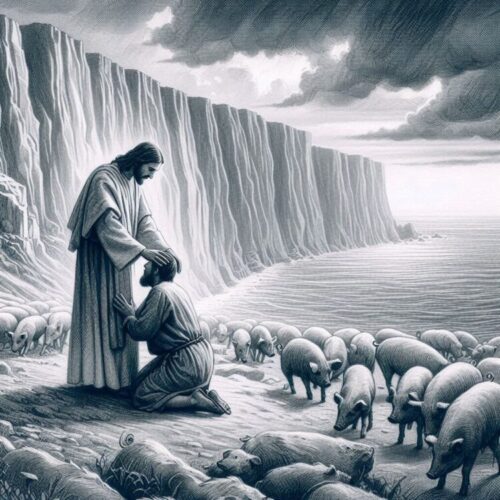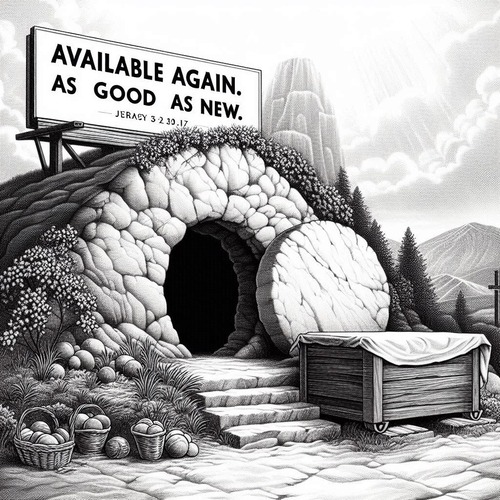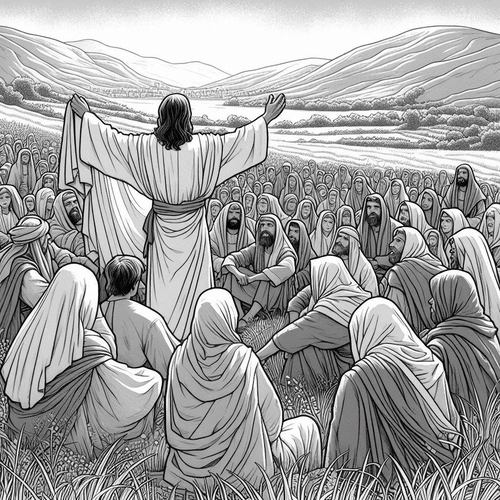When Demons Ask Permission: What Mark 5 Reveals About Jesus
The account of the demon-possessed man in Mark 5 presents one of the most dramatic demonstrations of Christ’s identity—and His authority over the spiritual realm. Among its many striking elements, the demons’ specific request—to enter a herd of pigs—raises intriguing theological questions…
Why are demons, powerful spiritual beings, reduced to asking permission? And why would they wish to enter swine—couldn’t they simply have roamed free? These questions, in turn, give way to even bigger ones: what does this story tell us about demonology, divine sovereignty, and the nature of Christ’s authority?
And perhaps most remarkably, what does it reveal about the heart of our Saviour—who braved a night of storm at sea, venturing into Gentile territory, to seek out one tormented, friendless soul living alone among the tombs?…
BIBLICAL CONTEXT AND BACKGROUND
The Geographic and Cultural Setting: The event takes place in the “country of the Gerasenes,” a predominantly Gentile region east of the Sea of Galilee. The presence of a large herd of pigs (about 2,000 according to Mark 5:13) confirms the Gentile character of the area, as no Jewish farmer would maintain such a herd of ritually unclean animals. The setting is significant, indicating Christ’s authority extends beyond Jewish territories and cultural boundaries.
Demonology in Scripture: Scripture consistently presents demons as created beings, fallen angels who rebelled with Satan. While powerful, they’re neither omnipotent nor independent of God’s sovereign control. Throughout the Bible, we see demons operating within divinely established parameters, never acting with complete autonomy. Job 1-2 provides a crucial framework, showing even Satan himself must obtain permission for his activities.
WHEN DEMONS ASK PERMISSION: ANALYSIS OF THE DEMONS’ REQUEST
The Nature of the Request: The demons’ request is revealing in several ways. First, they identify themselves as “Legion,” indicating they’re a vast number. Their plea, “Send us into the pigs; let us enter them” (Mark 5:12), demonstrates both their limitations and their recognition of Christ’s supreme authority. They cannot act without His permission, even in a Gentile territory.
Key Questions About Demonic Activity: The demons’ desire for physical habitation suggests they seek to influence the physical world through tangible means. This aligns with other biblical accounts where demons afflict people physically or mentally. Their aversion to being sent “out of the country” (Mark 5:10) implies territorial aspects to their activity, though always under divine sovereignty.
REFORMED THEOLOGY PERSPECTIVES
Divine Sovereignty:
From a Reformed perspective, the account demonstrates God’s absolute sovereignty over all creation, including evil spirits. Demons must ask permission, showing they’re not free agents but creatures subject to Christ’s authority. As Calvin notes in his commentary, even a legion of demons cannot resist one word from Christ.
Why Don’t Demons “Roam Free”?
The demons’ inability to “roam free” reflects God’s restraining grace in creation. Several factors explain this limitation:
- God’s mercy in restricting evil’s influence
- The created order’s structure requires spiritual beings to operate through physical means in the material world
- Divine wisdom in making evil’s destructive nature visible through physical manifestations
Christ’s Authority
The episode demonstrates Christ’s absolute authority over the spiritual realm. His authority is:
- Immediate—requiring no ritual or preparation
- Complete—the demons must obey
- Sovereign—extending even over legions of spirits simultaneously
Christ—the Seeking Saviour
The Gerasene exorcism reveals something profound about how Christ exercises His divine authority. Here we see the Lord of all creation deliberately crossing the sea, weathering a violent storm, to seek out a single tormented soul in Gentile territory. This wasn’t a chance encounter but a purposeful mission of mercy. That Jesus immediately returns after the healing powerfully suggests He came solely for this one man—a man so possessed that he lived among the tombs, rejected by society and bound in chains.
This mirrors the grand narrative of Christ’s incarnation itself: just as He left heaven’s glory to seek and save lost humanity, here He leaves the familiar shores of Galilee to rescue one desperate soul. His supreme authority over demons serves not to demonstrate raw power, but to accomplish His mission of redemption. In this way, the story reveals not just Christ’s absolute sovereignty over evil, but how that sovereignty serves His sacrificial love.
PASTORAL AND PRACTICAL IMPLICATIONS
Understanding Spiritual Authority: The account provides several crucial lessons for the church: Christ’s victory over evil is complete and decisive. So believers need not fear demonic power, as it is fully subject to Christ. And the church’s authority in spiritual warfare derives entirely from Christ.
God’s Sovereign Protection: As Reformed theology emphasises, God’s sovereignty provides genuine comfort in spiritual warfare. Believers can rest in knowing no demon can act without divine permission. Christ’s authority is absolute and unchanging. And God’s protection is sufficient and reliable.
Comfort for the Suffering: The narrative speaks comfort to those feeling isolated or overwhelmed by their struggles. Consider how Christ specifically sought out a man who lived among the tombs—a man quite literally at the margins of society. Neither the man’s fearsome condition, his isolation, nor his reputation deterred the Lord who’d crossed the sea specifically to find him. This same seeking love continues today. The Lord who braved a storm to reach one demoniac still pursues His lost sheep with unwavering determination. No situation lies beyond His reaching love, no soul too far gone for His grace. When we understand Christ’s authority over evil exists in perfect harmony with His seeking love, we find deep comfort. The power that commands demons is wielded by the heart that crosses seas to save one lost soul.
These encounters with Christ never leave a person unchanged. Just as the demoniac was transformed from a man who drove others away to one who proclaimed Christ’s mercy throughout the Decapolis, Christ’s reaching love continues to seek, save, and transform lives today. His power over evil serves His greater purpose: the rescue and restoration of those He loves. For those feeling overwhelmed by darkness, this truth offers extraordinary hope—the same Christ who crossed the sea that night still moves heaven and earth to reach His people.
APPLICATION FOR CONTEMPORARY MINISTRY
Spiritual Warfare Today: The passage establishes a biblical framework that helps us make sense of spiritual warfare. It:
- Acknowledges the reality of demonic activity
- Emphasises Christ’s supreme authority
- Avoids both scepticism and unhealthy preoccupation with demons
Pastoral Care: When counselling those concerned about demonic activity, the text provides several key principles:
- Christ’s authority is absolute and available to believers
- Demons are limited and must operate under divine permission
- God’s sovereignty means evil cannot exceed His appointed boundaries
CONCLUSION: WHEN DEMONS ASK PERMISSION
The demons’ request to enter the pigs, far from being a curious detail, reveals fundamental truths about spiritual reality. It demonstrates Christ’s identity and sovereignty, and the limitations placed on evil.
The account does more than just document an ancient exorcism; it reveals enduring truths about the nature of spiritual authority and the limitations of evil. For believers, the narrative offers deep comfort: if demons must ask permission, surely no spiritual force can operate outside God’s sovereign control. It reminds us in our own encounters with spiritual warfare, we serve a Lord whose authority is so complete that even the mightiest congregation of demons must bow before Him, asking permission for their next move. Oh, what comfort this truth offers us in our daily struggles with powerful spiritual opposition!
WHEN DEMONS ASK PERMISSION—RELATED FAQs
What does Calvin say about why the demons asked to enter the pigs? Calvin focuses primarily on how the request demonstrates Christ’s absolute authority rather than speculating about the demons’ motivations. He sees their request as evidence of their desperate condition, noting they would prefer any habitation to being cast into the abyss. Calvin emphasises that even a “legion” of demons must bow before a single word from Christ.
How do contemporary Reformed scholars interpret this passage? Contemporary Reformed scholars generally view this episode as a demonstration of Christ’s kingdom authority extending over both spiritual and physical realms. They emphasise how the passage illustrates Christ’s comprehensive dominion over creation and see the demons’ request as evidence of their status as limited, created beings. Joel Beeke and Paul Smalley, for instance, place this within the broader context of God’s sovereign constraints on evil.
What does Reformed systematic theology teach about this event? Reformed systematic theology typically addresses the episode within the framework of providence and spiritual warfare, seeing it as evidence of God’s ongoing sovereign control over evil powers. This perspective emphasises that even demons must operate within divinely established boundaries and cannot act without divine permission. The event is seen as a demonstration of Christ’s mediatorial kingdom in action.
Why didn’t Jesus simply destroy the demons? From a Reformed perspective, Jesus’ handling of the demons demonstrates God’s wisdom in progressively revealing His kingdom authority. The visible destruction of the pigs serves as a tangible demonstration of both demonic destructiveness and Christ’s power. The approach also reveals Christ’s authority to all observers in a way that mere banishment might not have accomplished.
What is the significance of the demons being called “Legion”? The name “Legion” indicates an overwhelming numerical force, as a Roman legion typically contained around 6,000 soldiers. This detail emphasises the magnitude of Christ’s authority, showing that even thousands of demons must submit to His word. The military terminology also suggests an organised opposition to God’s kingdom that nonetheless remains under Christ’s authority.
Why did Jesus allow the demons to destroy the pigs? Reformed theology sees this as serving multiple purposes in God’s sovereign plan. It provides visible evidence of both the demons’ destructive nature and Christ’s absolute authority over them. The destruction of the pigs also serves as a powerful object lesson about the real cost and consequences of evil, while demonstrating that material losses are secondary to human redemption.
What does this passage teach us about spiritual warfare today? The passage demonstrates believers needn’t fear demonic power since even the strongest demons must submit to Christ’s authority. It shows spiritual warfare occurs within God’s sovereign boundaries and that Christ’s authority is absolute and available to His church. The episode reminds us while demons are real, they’re decisively defeated and controlled by Christ.
WHEN DEMONS ASK PERMISSION—OUR RELATED POSTS
- Why do We Affirm Jesus is Fully God and Fully Man?
- The Eternal Son: How is Jesus Begotten of the Father?
Editor's Pick

The Throne-Room Vision: Who Did Isaiah See?
The scene is unforgettable: Isaiah stands in the temple, and suddenly the veil between heaven and earth tears open. He [...]

The Angel of the Lord: Can We Be Certain It Was Christ All Along?
Throughout the Old Testament, a mysterious figure appears: the Angel of the LORD. He speaks as God, bears God’s name, [...]
SUPPORT US:
Feel the Holy Spirit's gentle nudge to partner with us?
Donate Online:
Account Name: TRUTHS TO DIE FOR FOUNDATION
Account Number: 10243565459
Bank IFSC: IDFB0043391
Bank Name: IDFC FIRST BANK






